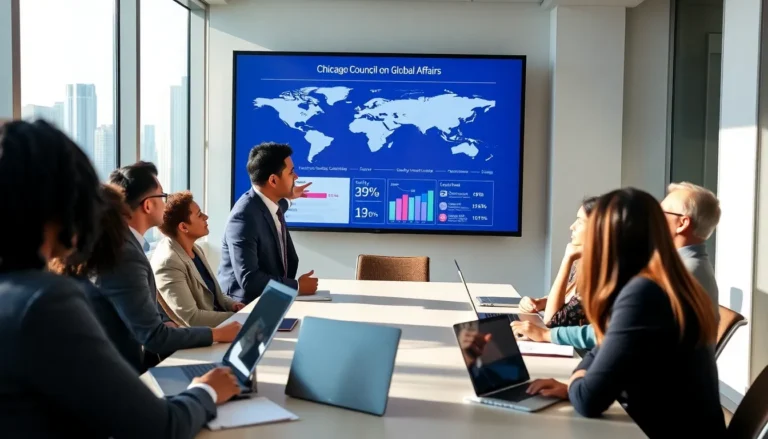Table of Contents
ToggleIn a world where information travels faster than a cat meme going viral, global public affairs has never been more crucial. It’s the art of navigating the complex web of politics, culture, and economics that shapes our daily lives. Think of it as the ultimate diplomatic dance, where every step counts and missteps can lead to a public relations disaster worthy of a reality TV show.
As nations grapple with challenges like climate change, trade wars, and social movements, understanding the nuances of global public affairs becomes essential. It’s not just about policies and diplomacy; it’s about connecting with people and making an impact. So, buckle up as we explore how global public affairs can turn the chaos of international relations into a symphony of cooperation, innovation, and maybe even a little bit of humor along the way.
Overview of Global Public Affairs
Global public affairs encompass the strategies and practices organizations implement to navigate the political, cultural, and economic landscapes across nations. Complexity within these spheres requires adept skills in communication and relationship-building. Effective engagement with stakeholders, such as government bodies, NGOs, and the general public, fosters an environment conducive to collaboration.
Addressing pressing issues like climate change or trade disputes highlights the need for well-informed public affairs strategies. These strategies inform policymakers while also creating dialogue among various communities. By integrating cultural awareness and political insight, organizations can avoid potential missteps that might lead to public relations crises.
Successful global public affairs rely on understanding diverse perspectives. Nations today must also balance their interests with those of the international community. Transparency in communication plays a vital role in this balancing act. Engaging in proactive discussions prevents misunderstandings and facilitates lasting partnerships.
Public affairs professionals monitor trends and shifts in policies globally. They analyze data and craft messages tailored to specific audiences. Collaborating with media outlets amplifies the reach of these messages, ensuring a wider impact. Regulatory changes affect strategies, requiring organizations to adapt and remain informed.
Connecting people through tailored communications enhances relationships across borders. This, in turn, leads to more effective advocacy and policy development. Ultimately, navigating global public affairs is about building trust and credibility in a crowded information environment. Engaging with diverse audiences and leveraging technology, professionals can drive initiatives that promote cooperation and resilience.
Importance of Global Public Affairs
Global public affairs play a crucial role in navigating the complexities of today’s interconnected world. This field influences how organizations effectively interact with various stakeholders.
Economic Impact
Economic growth often hinges on effective public affairs strategies. Organizations that engage in global public affairs can better understand international markets, leading to improved trade relationships. By fostering collaboration between governments and businesses, these strategies contribute to economic stability, driving investments and innovations. Data shows that countries with transparent public affairs practices experience higher foreign direct investment. Enhanced communication between sectors fosters a favorable business environment, encouraging sustainable development that benefits all parties involved.
Social Impact
Social cohesion frequently relies on the principles of global public affairs. Strategies that prioritize cultural awareness promote understanding among diverse populations. Effective communication helps prevent misinformation, which can lead to social unrest. Engaging with communities strengthens relationships, fostering trust and collaboration. Research indicates that organizations with strong public affairs practices are better positioned to address social issues—like inequality and health disparities—resulting in more resilient societies. Through meaningful dialogue and partnerships, public affairs initiatives can drive social change, enhancing the well-being of communities worldwide.
Key Players in Global Public Affairs
Governments, non-governmental organizations, and corporations play crucial roles in global public affairs, shaping policies, addressing issues, and influencing public perceptions. Each entity contributes uniquely to the landscape.
Governments
Governments stand at the forefront of global public affairs. They create and implement policies affecting international relations, trade, and environmental standards. While national interests drive their agendas, collaboration with other nations enhances global stability. Multilateral agreements, such as the Paris Agreement on climate change, exemplify this cooperative approach. Transparency fosters trust, enabling governments to engage effectively with citizens and organizations alike.
Non-Governmental Organizations
Non-governmental organizations (NGOs) hold significant influence in public advocacy. They’re pivotal in addressing social issues, promoting human rights, and providing humanitarian aid. Many NGOs act as watchdogs, holding governments accountable and raising awareness about critical matters. Collaboration with local communities strengthens their impact, allowing NGOs to tailor initiatives to specific needs. By leveraging grassroots support and utilizing digital platforms, NGOs expand their reach and effectiveness globally.
Corporations
Corporations increasingly engage in global public affairs to navigate regulations and enhance their reputations. Corporate social responsibility initiatives demonstrate a commitment to ethical practices and community well-being. Companies participate in discussions on sustainability and economic development, aligning with global standards. Their influence grows as they partner with governments and NGOs to tackle pressing issues. Strategic communication ensures that corporations convey their messages effectively while fostering positive relationships with stakeholders.
Trends in Global Public Affairs
Global public affairs continues to evolve, reflecting changes in technology, society, and the environment. Two emerging trends stand out: digital diplomacy and climate change initiatives.
Digital Diplomacy
Digital diplomacy leverages technology to enhance communication between nations and stakeholders. Social media platforms serve as tools for real-time engagement, fostering dialogue on important global issues. Governments increasingly utilize these platforms to promote transparency and gather public opinion. Successful campaigns often involve influencers who amplify messages and connect with wider audiences. Engaging in online forums also allows for the exchange of ideas and perspectives, breaking down geographic barriers. As technology advances, the importance of cyber diplomacy grows, influencing how nations navigate international relations.
Climate Change Initiatives
Climate change initiatives represent a critical area of focus within global public affairs. Governments, NGOs, and corporations collaborate to implement strategies addressing environmental challenges. International agreements like the Paris Agreement underscore the global commitment to reducing carbon emissions. Numerous organizations advocate for sustainable practices, influencing policies across multiple sectors. Engaging local communities enhances these initiatives by fostering grassroots support. Policymakers face pressure to incorporate climate considerations in economic decisions, urging a shift toward sustainable development. Collaborative efforts can drive innovative solutions, thereby promoting resilience against climate impacts.
Challenges in Global Public Affairs
Global public affairs face numerous challenges that impact effective communication and stakeholder engagement. Navigating political dynamics and resource allocation presents significant obstacles.
Political Conflicts
Political conflicts emerge as a primary challenge in global public affairs. Organizations encounter differing national interests that complicate negotiations. Socio-political tensions can escalate quickly, leading to public distrust and misinformation. Public affairs professionals must analyze political climates carefully to mitigate risks. Strategies that prioritize diplomacy often enable better outcomes. Tailored messaging becomes crucial when dealing with sensitive political issues. Engaging local stakeholders proves essential for fostering an inclusive environment.
Resource Allocation
Resource allocation poses another formidable challenge in the realm of global public affairs. Organizations often face limited resources while trying to address complex global issues. Budget constraints may hinder strategic communication efforts. Prioritizing projects that yield the highest impact becomes vital to optimizing resource distribution. Collaboration among governments, NGOs, and corporate entities enhances efficiency. Engaging in partnerships allows for shared resources and knowledge. Ultimately, effective resource management contributes to more meaningful public affairs initiatives.
Global public affairs play a pivotal role in shaping the interactions between nations and communities. As complexities rise in the political and economic landscape, understanding these dynamics becomes essential for fostering collaboration and trust. Organizations that prioritize effective communication and cultural awareness are better equipped to address pressing global challenges.
By leveraging technology and embracing innovative strategies, public affairs professionals can enhance their outreach and impact. The ability to navigate diverse perspectives while maintaining transparency will not only prevent misunderstandings but also promote lasting partnerships. Ultimately, a commitment to resilience and cooperation in global public affairs can drive meaningful social change and contribute to a more stable and prosperous world.





